Gambiaj.com – (BANJUL, The Gambia) – A comprehensive World Bank Gender Assessment has shed light on the significant yet underutilized role of women in The Gambia’s tourism sector. Despite the industry’s potential to be a driving force for women’s economic empowerment, systemic gender disparities and societal challenges continue to hinder progress.
The report’s findings emphasizes the gender disparities across employment, entrepreneurship, and leadership in the tourism sector, while highlighting both challenges and actionable opportunities for change.
The tourism sector, contributing up to 16% of The Gambia’s GDP pre-pandemic, employs thousands directly and indirectly. However, the report highlights that women occupy only 35% of full-time jobs, with most of these roles concentrated in lower-paying, part-time, or seasonal positions.
Key barriers include restrictive societal norms, safety concerns for women working late hours, and limited access to higher-paying opportunities such as managerial roles or tour guiding.
Entrepreneurship, a vital part of the sector, shows similar gender gaps. Female-led businesses are overwhelmingly micro-scale, with 83% operating as solo ventures, compared to 63% for male-owned businesses.
These women face hurdles in securing financing, skills development, and market access, further limiting their ability to scale or diversify. Median monthly profits for women-owned businesses stand at just GMD 3,000, compared to GMD 5,000 for male counterparts.
Leadership representation paints an even starker picture. None of the key tourism bodies, such as the Gambia Tourism Board or the Gambia Tourism and Hospitality Institute, are headed by women.
This absence of female voices in decision-making perpetuates stigma and limits the implementation of policies to safeguard women in the workplace, particularly in addressing the country’s troubling association with sex tourism.
Despite these challenges, the report identifies opportunities for change. Emerging segments like eco-tourism and conference tourism are highlighted as pathways for diversifying the industry while creating safer, more inclusive roles for women.
Eco-tourism initiatives, for example, often hire and source locally, empowering women in rural communities. Conference tourism, bolstered by the country’s convention center, has also opened new avenues in event planning, catering, and marketing.
The report recommends actionable steps to advance gender equity, including targeted skills training, stronger policies against harassment, and enhanced support for women entrepreneurs. Data collection on gender-disaggregated employment and income is emphasized as a critical tool for tracking progress.
These findings will inform the World Bank’s $68 million Tourism Diversification and Resilience in The Gambia Project, aimed at strengthening the sector’s inclusivity and resilience.
By tackling systemic barriers and fostering a safer work environment, the project aims to unlock the untapped potential of women, transforming the tourism industry into a model of gender equity and sustainable growth.










